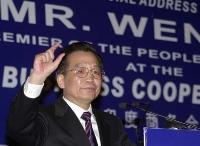First visit in seven years, China visits Japan
For the first time in seven years China's premier will visit Japan.

Expectations for the visit are mixed, yet the mere fact that Premier Wen Jiabao is going reflects a sharp turnaround in relations that began with an icebreaking visit to Beijing by Japanese Prime Minister Shinzo Abe last September.
"I feel strongly that my trip has a real mission," Wen told Japanese reporters in Beijing ahead of the three-day visit starting Wednesday. "Sino-Japanese relations are at a critical stage and both countries should make an effort to push forward ties."
Wen plans to address lawmakers and issue a joint statement with Abe expressing their "aspirations to build a strategic and mutually beneficial relationship." Military cooperation, economic dialogue, and collaboration on energy conservation, environmental protection and finance are also on the agenda.
In an attempt to emphasize the human side of relations, Wen said he even plans to join a university team in a game of baseball.
David Shambaugh, director of the China Policy Program at George Washington University in Washington D.C., said both sides, but particularly China, want to "put a floor" beneath relations.
"Abe wants to boost domestic support by handling of China relations well. China wants stability through improving ties," said Guo Dingping, a Japan scholar at Shanghai's Fudan University.
But Chinese critics of Japan say underlying anger will continue to overshadow progress toward the normalization of ties.
"The gulf isn't easy to eliminate," said Feng Jinhao, a former student in Japan who gained instant fame in China for vandalizing statues outside Tokyo's Yasukuni Shrine, which honors dead Japanese soldiers, including executed war criminals.
Since Abe's visit last autumn, the two sides have tried to set aside rancorous issues dating back to World War II that erupted into sometimes violent anti-Japanese protests in 2005. China has long accused Japan of trying to minimize its war guilt in both comments by politicians and in school history textbooks.
Territorial disputes and conflicting claims to gas deposits in the East China Sea added to the friction, threatening to disrupt thriving economic ties and unnerving neighbors, who urged the two to resolve the impasse.
Some Chinese saw the dispute pushing Japan closer to its American ally, frustrating Beijing's goal of assuming the role of regional power broker..
Both sides moved quickly to restore links following the departure in September of Abe's predecessor, Junichiro Koizumi, who had enraged China with his visits to the Yasukuni Shrine. Abe visited China just two weeks after taking up his post.
Since then, Chinese leaders and the state-controlled media have toned down their anti-Japanese rhetoric, responding only mildly to Abe's push to reform Japan's pacifist constitution to give the military a bigger profile. Provocative moves such as Abe's comments downplaying Japan's responsibility for consigning sex slaves to military brothels have drawn an unusually calm response.
Abe, whose popularity at home has slumped, has also stayed away from Yasakuni, although he hasn't said whether he would forego such visits altogether.
Recent efforts by Chinese and Japanese historians to forge a consensus on sensitive wartime events broke down. There is no sign of progress on conflicts over offshore gas drilling, and Japan's bid for a permanent seat on the U.N. Security Council _ a key grievance in 2005, remains a nonstarter for China, which holds a veto as one of five permanent members.
Wen's visit will emphasize the positive aspects of relations, including shared interests in trying to resolve tensions over North Korea's nuclear program.
Economic ties will also feature highly: Japan is China's third biggest trading partner and second largest source of foreign investment, with bilateral trade hitting US$207.4 billion (Ђ155 billion) last year.
Balancing the need for pragmatism while upholding nationalist sentiments will be a key test of Wen's leadership, said Yu Maochun, a history professor at the U.S. Naval Academy in Annapolis, Maryland.
"In all of China's dealings with its neighbors, Japan remains the toughest nut to crack," Yu said.
Subscribe to Pravda.Ru Telegram channel, Facebook, RSS!


